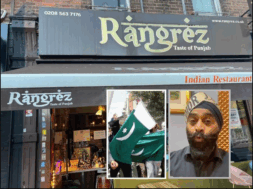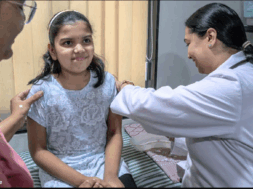
Covid-19: PM Modi’s food security scheme averted rise in extreme poverty, says IMF
Virendra Pandit
New Delhi: When nationwide lockdowns led to job losses, Prime Minister Narendra Modi’s food security scheme, launched in March 2020 amid the pandemic, prevented a rise in extreme poverty in India, the International Monetary Fund (IMF) said.
An IMF study, “Pandemic, Poverty, and Inequality: Evidence from India” stated that the Pradhan Mantri Garib Kalyan Yojana (PMGKY), providing free food grain to the poor, played a critical role in preventing any increase in extreme poverty levels in India during the Covid-19 pandemic.
The new IMF working paper said extreme poverty (with purchasing power parity, or PPP, of up to USD 1.9 per person per day) in India was less than 1 percent in 2019 and stayed constant even during the pandemic in 2020.
“The PMGKAY was critical in preventing any increase in extreme poverty levels in India and the doubling of food entitlements worked substantially to absorb the Covid-induced income shocks on the poor,” the report stated.
In March, PM Modi announced PMGKAY’s extension until September 2022.
“A low level of extreme poverty for two consecutive years, including one marked by the pandemic, can be considered as elimination of extreme poverty,” it read.
The report stated the pandemic shock was largely a temporary income shock and that temporary fiscal policy interventions were fiscally appropriate to absorb a large part of it.
Consumption growth, an important determinant of poverty, was found higher in 2014-19 than the robust growth observed in 2004-2011.
“Extreme poverty was as low as 0.8 percent in the pre-pandemic year 2019, and food transfers helped to ensure that it remained at that low level in the pandemic year 2020,” the paper said.
The safety net of free food grains cushioned Covid-19’s economic shock, providing insurance to the poor and preventing any sharp increase in extreme poverty levels during the pandemic year 2020, it said.
Authors of the working paper were Surjit Bhalla, Executive Director, IMF for India, Bangladesh, Bhutan, and Sri Lanka, and former part-time member of the Prime Minister’s Economic Advisory Council; New York-based economist Karan Bhasin; and Arvind Virmani, former Chief Economic Adviser to the Government of India.
The World Bank had defined extreme poverty as a share of people living under USD 1.9 every day as per the 2011 PPP terms, it said. “The low level of extreme poverty–around 0.8 percent in both 2019 (0.76 percent) and 2020 (0.86 percent)—suggests the need for the official poverty line to now be PPP USD 3.2,” it added.
Under the PMGKAY, the Centre provides 5 kg of food grains per month per person for free to the poor people. The additional free grain is over and above the normal quota provided under the National Food Security Act (NFSA) at a subsidized rate of Rs 2-3 per kilogram.
The paper noted that the PPP cap at the USD 1.9 poverty line is no longer appropriate for India. “It is accepted as the extreme poverty line around the world and used as a reference standard for claims about the elimination of extreme poverty. By this standard, India can reasonably claim that in pre-pandemic India was on the verge of eliminating extreme poverty,” it said.
It also said extreme poverty had reached a low 2 percent level in 2016-17. “According to the more appropriate but 68 percent higher Low Middle Income (LMI) poverty line of PPP USD 3.2 a day, poverty in India registered 14.8 percent in the pre-pandemic year 2019-20,” the paper noted.














